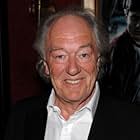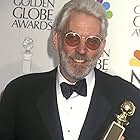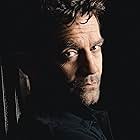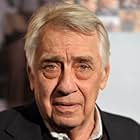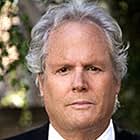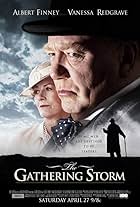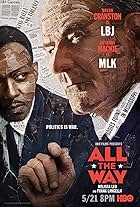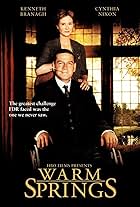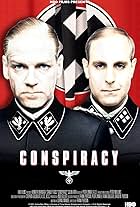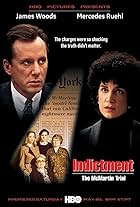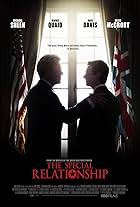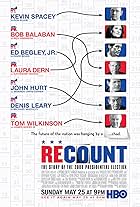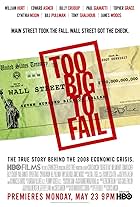IMDb RATING
7.3/10
4.3K
YOUR RATING
In the mid 1960s, President Lyndon B. Johnson (Sir Michael Gambon) and his foreign-policy team debate the decision to withdraw from or escalate the war in Vietnam.In the mid 1960s, President Lyndon B. Johnson (Sir Michael Gambon) and his foreign-policy team debate the decision to withdraw from or escalate the war in Vietnam.In the mid 1960s, President Lyndon B. Johnson (Sir Michael Gambon) and his foreign-policy team debate the decision to withdraw from or escalate the war in Vietnam.
- Nominated for 8 Primetime Emmys
- 1 win & 27 nominations total
Cliff De Young
- McGeorge Bundy, National Security Advisor
- (as Cliff DeYoung)
- Director
- Writer
- All cast & crew
- Production, box office & more at IMDbPro
Storyline
Did you know
- TriviaThe extensive historical research for this movie resulted in a script with a five-page, single-spaced bibliography.
- GoofsAt one point Robert McNamara tells President Johnson that there are 13 US battalions in Vietnam, and goes on to say this is 51,000 troops. This would mean approximately 4,000 troops per battalion. Given that a US battalion would only have 500-800 troops he is actually talking about 13 brigades (each containing several battalions) and not 13 battalions.
- Quotes
Lyndon Baines Johnson: [Looking at the fighter jet escort next to Air Force One] Dean!
Dean Rusk, Secretary of State: Are they ours?
Lyndon Baines Johnson: I fuckin' hope so.
- ConnectionsFeatured in The 54th Annual Primetime Emmy Awards (2002)
Featured review
Well-made, at times moving HBO dramatization of the goings-on within the White House as the Vietnam War escalated under Lyndon Johnson.
Michael Gambon plays the U.S. president as a sort of tragic figure torn between his passion for "Great Society" social programs and a resiliency to win the war. The Johnson seen in PATH TO WAR is certainly not the war-monger that protesters of his day alleged. He's meticulous and thoughtful, though perhaps too easily persuaded by his advisers, most notably Secretary of Defense Robert McNamara (Alec Baldwin in his most memorable performance in a long time) and Clark Clifford (an equally superb Donald Sutherland).
In his final film, director John Frankenheimer could be criticized for being a touch soft on Johnson. But this approach, fair or not, serves the film well, allowing us to more easily empathize with the straight-talking Texan. He had men of very high stature and respect telling him that just one more bombing, just one more plane full of troops, just a few more months and the war would be won. The viewer has the 20/20 hindsight of history, but Frankenheimer was careful to remind us that Johnson did not. This makes for some emotional moments. Scenes of the reluctant war president signing sympathy letters for families of the fallen are quietly moving, as is his trip to meet with the wounded in Vietnam. Just as poignant is the instance of Johnson stomping out of a meeting, instructing a speech writer that because of the war's costs, there could be no mention of his beloved Great Society in the next State of the Union address. It seems all Johnson wanted was a better life for Americans; all he got was a bloody quagmire.
As the film and war rage on, body counts rising, Johnson unravels. Consumed by years of warfare with no end in sight, he becomes tense, bitter and worn down. Whether they like Johnson or not, the viewer feels the weight on his shoulders. Even someone unfamiliar with how this story ends could predict it from watching PATH TO WAR. To conclude the 165-minute running time, Johnson delivers his famous televised address announcing he would not seek re-election. He may have wanted to, yet knew he could not.
PATH TO WAR is a sharp interpretation of a tragically fascinating era. Unlike some other versions of political history (Oliver Stone, anyone?), the film never comes off as mean-spirited, even toward characters who remain infamous. It is a straightforward look at the complexities of the often-muddy waters of war and politics. It is also a quite memorable piece of work.
Michael Gambon plays the U.S. president as a sort of tragic figure torn between his passion for "Great Society" social programs and a resiliency to win the war. The Johnson seen in PATH TO WAR is certainly not the war-monger that protesters of his day alleged. He's meticulous and thoughtful, though perhaps too easily persuaded by his advisers, most notably Secretary of Defense Robert McNamara (Alec Baldwin in his most memorable performance in a long time) and Clark Clifford (an equally superb Donald Sutherland).
In his final film, director John Frankenheimer could be criticized for being a touch soft on Johnson. But this approach, fair or not, serves the film well, allowing us to more easily empathize with the straight-talking Texan. He had men of very high stature and respect telling him that just one more bombing, just one more plane full of troops, just a few more months and the war would be won. The viewer has the 20/20 hindsight of history, but Frankenheimer was careful to remind us that Johnson did not. This makes for some emotional moments. Scenes of the reluctant war president signing sympathy letters for families of the fallen are quietly moving, as is his trip to meet with the wounded in Vietnam. Just as poignant is the instance of Johnson stomping out of a meeting, instructing a speech writer that because of the war's costs, there could be no mention of his beloved Great Society in the next State of the Union address. It seems all Johnson wanted was a better life for Americans; all he got was a bloody quagmire.
As the film and war rage on, body counts rising, Johnson unravels. Consumed by years of warfare with no end in sight, he becomes tense, bitter and worn down. Whether they like Johnson or not, the viewer feels the weight on his shoulders. Even someone unfamiliar with how this story ends could predict it from watching PATH TO WAR. To conclude the 165-minute running time, Johnson delivers his famous televised address announcing he would not seek re-election. He may have wanted to, yet knew he could not.
PATH TO WAR is a sharp interpretation of a tragically fascinating era. Unlike some other versions of political history (Oliver Stone, anyone?), the film never comes off as mean-spirited, even toward characters who remain infamous. It is a straightforward look at the complexities of the often-muddy waters of war and politics. It is also a quite memorable piece of work.
- ReelCheese
- Sep 7, 2006
- Permalink
Details
- Release date
- Country of origin
- Official site
- Language
- Also known as
- Đường đến chiến tranh
- Filming locations
- Production companies
- See more company credits at IMDbPro
Box office
- Budget
- $17,000,000 (estimated)
- Runtime2 hours 45 minutes
- Color
- Sound mix
- Aspect ratio
- 1.78 : 1
Contribute to this page
Suggest an edit or add missing content











